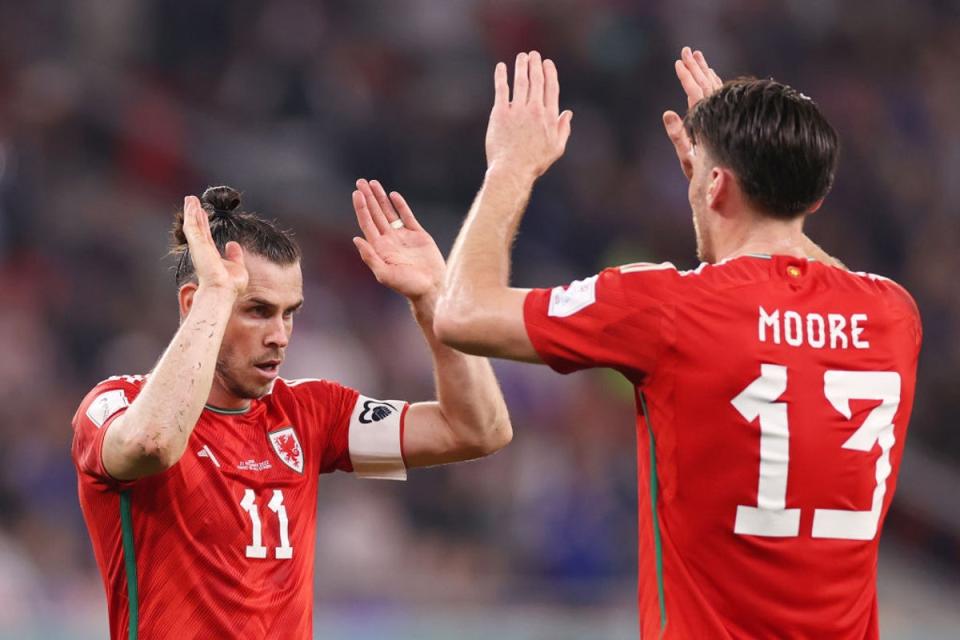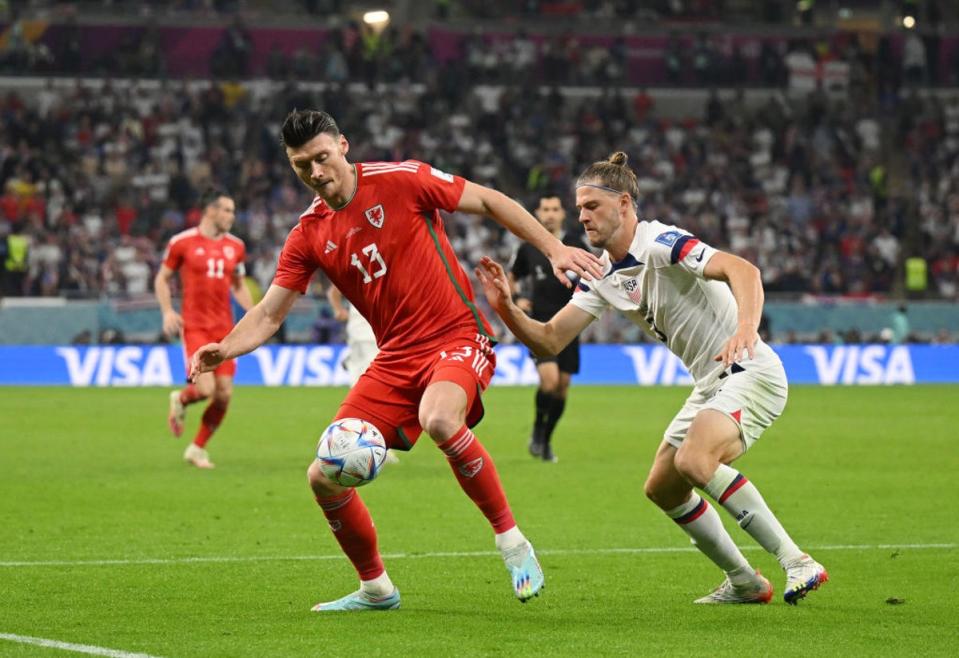Kieffer Moore continues remarkable rise to become Wales’ World Cup wrecking ball
- Oops!Something went wrong.Please try again later.
When Gareth Bale was 24, he was the £85 million signing who scored in the final of the Champions League. When Kieffer Moore was 24, he was playing non-league football for Forest Green Rovers. And when the United States returned to the World Cup, they were denied victory by a combination of Wales’ answer to an action hero and the footballer named after the star of 24.
Bale’s equaliser in a 1-1 draw earned him Fifa’s man of the match award. The Wales captain was not even his own man of the match, however. “Kieffer came on and made a big difference, he gave us that physicality and it was a great performance,” he said, nominating the substitute who made Wales’ first World Cup match for 64 years a game of two halves: one without Moore that the Americans dominated, one with him when Wales were transformed.
The Moore name lingers long in World Cup folklore: it is 56 years since Bobby wiped his hands on his shorts before collecting the Jules Rimet Trophy from the Queen, 52 since his effortlessly nonchalant tackle halted a flying Jairzinho. It is, though, the least remarkable part of Kieffer Roberto Francisco Moore’s moniker, the middle element to honour an Italian uncle, the start a tribute to Kiefer Sutherland, the actor who featured in A Few Good Men in 1992, the year the footballer was born.

Given the importance of team spirit to Wales, good men are of paramount importance to them. One was missing in the first half and pivotal in the second. Dan James was removed at the break so Moore could give Wales a focal point in attack and Harry Wilson, another who had a negligible impact before Moore’s arrival, accepted: “We found the first half really difficult. I think it made sense to bring Kieffer on and that gave us the platform to build.”
In a world increasingly populated by false nines, the old-fashioned centre-forward can look outmoded. Moore’s elbows mean he is liable to be booked, especially in international football, but, without incurring the referee’s displeasure, he struck a blow for traditional No. 9.
“Kieffer made a massive difference for us coming on and we looked a much better team second half,” said his Bournemouth team-mate Chris Mepham. “Any team coming up against him is going to struggle. I probably know him better than anyone, playing with him week in week out at club level. I know much of a handful he can be and certainly as a defender I wouldn’t like to come up against that.”
The Americans certainly did not as Moore dragged Wales up the pitch, allowed them to play in enemy territory and, indirectly, made an equaliser possible. Rewind to the 1980s and, in an informal interview to manage the United States, Malcolm Allison, noting the height of athletes in the NBA, suggested he would not pick anyone under 6ft 6in for their football team. It was absurd even for an original thinker and, unsurprisingly, Allison did not get the job. Yet as Moore, all 6ft 5in of him, the merits of a footballer the same height as their most capped rugby international, Alun Wyn Jones, when size is allied with the knowhow to bring others into the game.

For Wales, it was an action replay of sorts. They trailed in their Euro 2020 opener against Switzerland and drew thanks to Moore: then his input was still more obvious, as they levelled. That goal, on his major tournament debut, was proof enough of a remarkable rise but World Cups feel still more symbolic. Moore has come from the Conference South to the global showpiece, via Truro and Dorchester, Yeovil and Viking, Forest Green and Torquay. Whereas Bale cost Real Madrid £85 million, Moore was a £10,000 buy for Ipswich Town but he never started a game for them.
He was exiled to Rotherham just before he turned 25. He has excelled in a World Cup at 30. If, after 64 years, Wales took a long and winding road back to the global tournament, so did their super-sub. Moore has offered a reminder than World Cups not just the domain of those who are always destined for greatness. They can be reward for those who have toiled away in the footballing backwaters and for those whose unfashionable skillsets can still be effective at the highest level.

